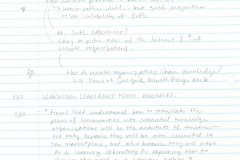
Chapter 10: Reweaving the World; Communities beyond organizations
May 2, 2020
“If you were the CKO of the world, how would you design your knowledge initiative?”
- Communities are not confined to a single organization (which is what I expect for the UX community)
- What are the boundaries of the UX community?
- How does the design community within your organization differ from the the UX community across organizations?
Communities in business to business clusters
- Manufacturers x suppliers x distributers x customers
- What is the UX version of this?
- Developers x UX x UI x UX researchers x users x marketing… (internal)
- UX x users x hardware x service stakeholders (external)
- What kind of relationships have you made outside of the organization (ex. supplier users), and how has that impacted how you work? (Maybe fore a specific project?)
Communities in consumer markets
- Businesses need knowledge from customers and customers want to let businesses know about their needs
- How do you keep in touch with user / client needs? How do you get their feedback? Is it a formal process?
- Customers also share knowledge with each other (ex. DIY blogs)
- How are users talking about the UX of your products? Ex. in blogs, product reviews, conferences, etc… And how do you use that feedback?
Communities across firms
- Ex. mergers, joint ventures, alliances
- Has your organization gone through any of the above? What was the process like? How have you changed the way you work?
Civil Society
- Case study of Boost4Kids (civic learning network)
- CoPs successfully implemented programs for children in at-risk families
- Community shared best practices and came with a solution that attracted different cities
- Model was adopted by other civic organizations to create social service programs
Community based world design
- Ex. CoPs of mayors from capital cities in Central America share ways to improve living conditions; organized by the World Bank
- View the world as a platform for CoPs
- This seems very idealized, but offers a good way to understand the scalability of CoPs
Learning leadership from business
Firms that understand how to translate the power of communities into successful knowledge organizations will be the architects of tomorrow—not only because they will be more successful in the marketplace, but also because they will serve as a learning laboratory for exploring how to design the world as a learning system.
Page 232



